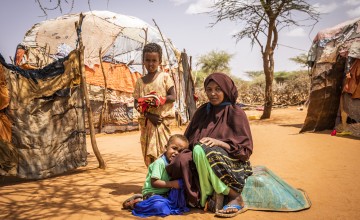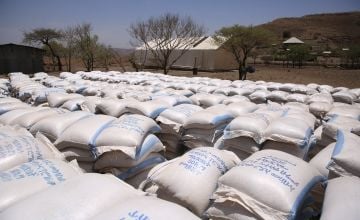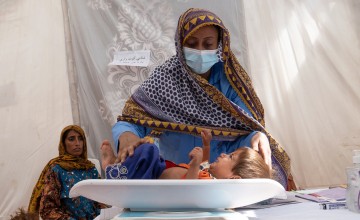
Read our 2023 annual report

Knowledge Hub
Global hunger is one of the biggest problems facing our world today — and one we’ve lost progress towards solving in recent years.
The hard truth is that we are not on track to reach Zero Hunger by 2030; estimates suggest that we’ll still have 670 million people experiencing hunger by then. In fact, between the pandemic and widespread conflict (including the current crisis in Ukraine), we’ve lost all progress made towards ending hunger since 2016.
Despite this, there is still reason to keep fighting. Here are nine key reasons why it’s important to end world hunger.
1. We won’t end poverty until we end hunger
Poverty and hunger go hand-in-hand. In most countries, malnutrition rates are highest among the poorest 20% of residents. The poorest and most vulnerable families — people with the fewest resources — are more likely to lose out on a well-balanced diet and key nutrients for a long, healthy life.
This can, in turn, have a lifetime of consequences. People who go hungry or suffer from malnutrition are more prone to disease and other barriers to improving their livelihoods and break the vicious cycle of poverty.
» Learn more about the cycle between poverty and hunger.

2. Food is a basic human right
Article 25 of the United Nations’ Universal Declaration of Human Rights states:
Everyone has the right to a standard of living adequate for the health and well-being of himself and of his family, including food, clothing, housing and medical care and necessary social services, and the right to security in the event of unemployment, sickness, disability, widowhood, old age or other lack of livelihood in circumstances beyond his control.
Having enough food to keep our bellies full and bodies running is a fundamental right, not a privilege.
3. Ending hunger will benefit economies
Hunger is an incredibly personal issue, but its impact doesn’t end there. You can read more about the economics of hunger in our explainer on the topic, but, simply put: The continuing prevalence of global hunger is bad for business. It inhibits productivity, slows economic growth, and places unnecessary burdens on health and education systems.
» Learn more about the economics of hunger.

4. Hunger disproportionately affects children
Hunger affects people of every age and gender, but children suffer the effects of hunger the hardest. (And girls are even more vulnerable in these circumstances due to harmful gender norms.) The first 1,000 days of a child’s development — from embryo to their second birthday — is a critical time to deliver essential nutrients for their growth. Currently, 45 million children under the age of five suffer from wasting (low weight for height), which can increase the risk of child mortality twelvefold. Additionally, 149 million children in the same age range are affected by stunting (low height for age), the result of nutritional deficiencies. Malnutrition is responsible for nearly 50% of all deaths of children under the age of five, and even those who survive into adolescence and adulthood can face a lifetime of consequences.

5. Successfully solving the hunger crisis will also address parts of the climate crisis
Climate change is one of the leading causes of hunger today, which means that some of the best solutions to hunger also address many of the effects of the climate crisis. Initiatives like Climate Smart Agriculture and home gardens not only provide families with more and better-quality food, they also help those living on the frontlines of the climate crisis to adapt to less-predictable weather patterns and some of the irreversible aspects of climate change. These solutions won’t solve the entire crisis, but they do go a long way towards ensuring that the most affected people and areas are able to live full, creative lives.
» Learn more about how climate change increases hunger.

6. Hunger and conflict are interconnected
In 2022, violent conflict remains one of the main causes of world hunger, exacerbated by climate change and Covid-19. Food systems in conflict-affected countries are more vulnerable to setbacks and have fewer safety nets, and hunger is often used as a weapon of war. In order to sustainably end hunger, we will need to address some of these issues, pushing for peaceful resolutions to ongoing conflicts (some of which have remained in play for decades), while also guaranteeing greater safety measures for civilians living in conflict zones.
» Learn more about the connection between conflict and hunger.
7. Ending hunger would have a knock-on effect for other health issues
As we’ve seen in famine situations, many fatalities associated with hunger aren’t due to hunger itself. Hunger and malnutrition weaken immune systems, leaving people — especially children, the elderly, and immunocompromised — vulnerable to other common diseases, especially water-borne illnesses. This includes malaria, cholera, and diarrhoea. Hunger also has a disproportionate effect on maternal health.
Eliminating hunger will allow public health systems — especially in countries with fewer resources — to more fully address other issues, while also reducing the impact of some of the most common illnesses that can turn fatal.
8. The world produces enough food to feed everyone living on it
One of the biggest reasons it’s important to end world hunger is that we already have the resources to do so. The world produces enough food to feed all 7.5 billion people — and the World Food Programme has proven that it currently produces enough to feed up to 10 billion (the anticipated global population for 2050). Food production continues to increase faster than population growth.
The problem, as we explained in our piece on hunger myths and facts, is that food systems in areas with high levels of hunger and food insecurity are broken. Food waste, poor infrastructure, ineffective governance and social services, climate change, and conflict are all potential interruptions to those systems. Those are a lot of issues to address, but none are impossible.

9. We’ve lost progress — but not hope
It’s dispiriting to see how much progress we’ve lost towards ending world hunger in recent years. However, that’s no reason to give up. Every day at Concern, we see children bounce back to life thanks to simple but effective treatments like RUTF (ready-to-use therapeutic food) after suffering extreme effects of malnutrition. We watch farmers grow more — and more diverse — crops that feed their families three times a day and provide a liveable income. We’ve seen communities and even countries transform (with this progress recorded over time in our Global Hunger Index).
We may not be able to end hunger by 2030, but it is still a fight that can be won in our lifetimes. And it’s something we keep working towards 365 days a year.





